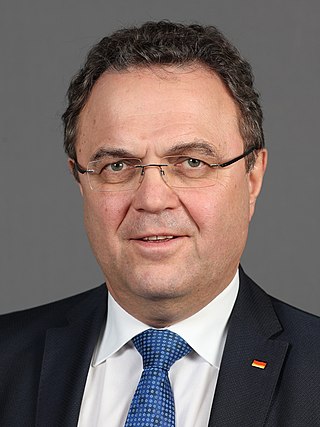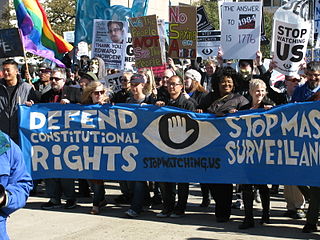
The National Security Agency (NSA) is a national-level intelligence agency of the United States Department of Defense, under the authority of the Director of National Intelligence (DNI). The NSA is responsible for global monitoring, collection, and processing of information and data for foreign and domestic intelligence and counterintelligence purposes, specializing in a discipline known as signals intelligence (SIGINT). The NSA is also tasked with the protection of U.S. communications networks and information systems. The NSA relies on a variety of measures to accomplish its mission, the majority of which are clandestine. The existence of the NSA was not revealed until 1975. The NSA has roughly 32,000 employees.

Jacob Appelbaum is an American independent journalist, computer security researcher, artist, and hacker.

Hans-Peter Friedrich is a German politician of the Christian Social Union (CSU) who has been serving as a member of the German Bundestag since 1998. Under the leadership of Chancellor Angela Merkel, he served as Federal Minister of the Interior (2011-2013) and as Minister for Food and Agriculture (2013). Friedrich resigned from that position in February 2014. Friedrich has a controversial history with minorities in Germany, causing outrage in 2013 after telling journalists that Islam in Germany is not something supported by history at any point.

Roderich Kiesewetter is a former Bundeswehr general staff officer and politician of the Christian Democratic Union (CDU) who has been serving as a member of the German Bundestag since 2009.

Philipp Riederle is a German author, consultant and keynote speaker. At the age of 13 he became famous with his podcast “Mein iPhone und Ich…” , with which he reached over one million viewers each year.

PRISM is a code name for a program under which the United States National Security Agency (NSA) collects internet communications from various U.S. internet companies. The program is also known by the SIGAD US-984XN. PRISM collects stored internet communications based on demands made to internet companies such as Google LLC and Apple under Section 702 of the FISA Amendments Act of 2008 to turn over any data that match court-approved search terms. Among other things, the NSA can use these PRISM requests to target communications that were encrypted when they traveled across the internet backbone, to focus on stored data that telecommunication filtering systems discarded earlier, and to get data that is easier to handle.

Boundless Informant is a big data analysis and data visualization tool used by the United States National Security Agency (NSA). It gives NSA managers summaries of the NSA's worldwide data collection activities by counting metadata. The existence of this tool was disclosed by documents leaked by Edward Snowden, who worked at the NSA for the defense contractor Booz Allen Hamilton. Those disclosed documents were in a direct contradiction to the NSA's assurance to United States Congress that it does not collect any type of data on millions of Americans.

Edward Joseph Snowden is a United States and naturalized Russian citizen who was a computer intelligence consultant and whistleblower who leaked highly classified information from the National Security Agency (NSA) in 2013 when he was an employee and subcontractor. His disclosures revealed numerous global surveillance programs, many run by the NSA and the Five Eyes intelligence alliance with the cooperation of telecommunication companies and European governments and prompted a cultural discussion about national security and individual privacy.

XKeyscore is a secret computer system used by the United States National Security Agency (NSA) for searching and analyzing global Internet data, which it collects in real time. The NSA has shared XKeyscore with other intelligence agencies, including the Australian Signals Directorate, Canada's Communications Security Establishment, New Zealand's Government Communications Security Bureau, Britain's Government Communications Headquarters, Japan's Defense Intelligence Headquarters, and Germany's Bundesnachrichtendienst.

The practice of mass surveillance in the United States dates back to wartime monitoring and censorship of international communications from, to, or which passed through the United States. After the First and Second World Wars, mass surveillance continued throughout the Cold War period, via programs such as the Black Chamber and Project SHAMROCK. The formation and growth of federal law-enforcement and intelligence agencies such as the FBI, CIA, and NSA institutionalized surveillance used to also silence political dissent, as evidenced by COINTELPRO projects which targeted various organizations and individuals. During the Civil Rights Movement era, many individuals put under surveillance orders were first labelled as integrationists, then deemed subversive, and sometimes suspected to be supportive of the communist model of the United States' rival at the time, the Soviet Union. Other targeted individuals and groups included Native American activists, African American and Chicano liberation movement activists, and anti-war protesters.

Ongoing news reports in the international media have revealed operational details about the Anglophone cryptographic agencies' global surveillance of both foreign and domestic nationals. The reports mostly emanate from a cache of top secret documents leaked by ex-NSA contractor Edward Snowden, which he obtained whilst working for Booz Allen Hamilton, one of the largest contractors for defense and intelligence in the United States. In addition to a trove of U.S. federal documents, Snowden's cache reportedly contains thousands of Australian, British, Canadian and New Zealand intelligence files that he had accessed via the exclusive "Five Eyes" network. In June 2013, the first of Snowden's documents were published simultaneously by The Washington Post and The Guardian, attracting considerable public attention. The disclosure continued throughout 2013, and a small portion of the estimated full cache of documents was later published by other media outlets worldwide, most notably The New York Times, the Canadian Broadcasting Corporation, the Australian Broadcasting Corporation, Der Spiegel (Germany), O Globo (Brazil), Le Monde (France), L'espresso (Italy), NRC Handelsblad, Dagbladet (Norway), El País (Spain), and Sveriges Television (Sweden).

Global mass surveillance can be defined as the mass surveillance of entire populations across national borders.

The ANT catalog is a classified product catalog by the U.S. National Security Agency (NSA) of which the version written in 2008–2009 was published by German news magazine Der Spiegel in December 2013. Forty-nine catalog pages with pictures, diagrams and descriptions of espionage devices and spying software were published. The items are available to the Tailored Access Operations unit and are mostly targeted at products from US companies such as Apple, Cisco and Dell. The source is believed to be someone different than Edward Snowden, who is largely responsible for the global surveillance disclosures since 2013. Companies whose products could be compromised have denied any collaboration with the NSA in developing these capabilities. In 2014, a project was started to implement the capabilities from the ANT catalog as open-source hardware and software.

Stop Watching Us was a protest effort against global surveillance that culminated in rallies on October 26, 2013.

Former U.S. President Barack Obama favored some levels of mass surveillance. He has received some widespread criticism from detractors as a result. Due to his support of certain government surveillance, some critics have said his support may have gone beyond acceptable privacy rights. This is of course a debatable conclusion. Many former US presidents have increased the abilities and techniques used for intelligence gathering. President Obama released many statements on mass surveillance.

This timeline of global surveillance disclosures from 2013 to the present day is a chronological list of the global surveillance disclosures that began in 2013. The disclosures have been largely instigated by revelations from the former American National Security Agency contractor Edward Snowden.
The German Parliamentary Committee investigation of the NSA spying scandal was started on March 20, 2014, by the German Parliament in order to investigate the extent and background of foreign secret services spying in Germany in the light of the Global surveillance disclosures (2013–present). The Committee is also in search of strategies on how to protect telecommunication with technical means.

Operation Eikonal is a collaboration between the National Security Agency (NSA) and Bundesnachrichtendienst (BND) for the sharing of telephony and Internet data captured in Germany. It is based on an agreement that dates to 2002, and is part of the NSA operation "RAMPART-A". Surveillance started in 2003, telephony data was collected from 2004 onwards, and all Internet traffic from the Deutsche Telekom (DT) switching center in Frankfurt was captured starting in 2005.

Open access to scholarly communication in Germany has evolved rapidly since the early 2000s. Publishers Beilstein-Institut, Copernicus Publications, De Gruyter, Knowledge Unlatched, Leibniz Institute for Psychology Information, ScienceOpen, Springer Nature, and Universitätsverlag Göttingen belong to the international Open Access Scholarly Publishers Association.
Stiftung Neue Verantwortung (SNV) is a German non-profit think tank based in Berlin that specializes in public policy related to technology's effect on society.















